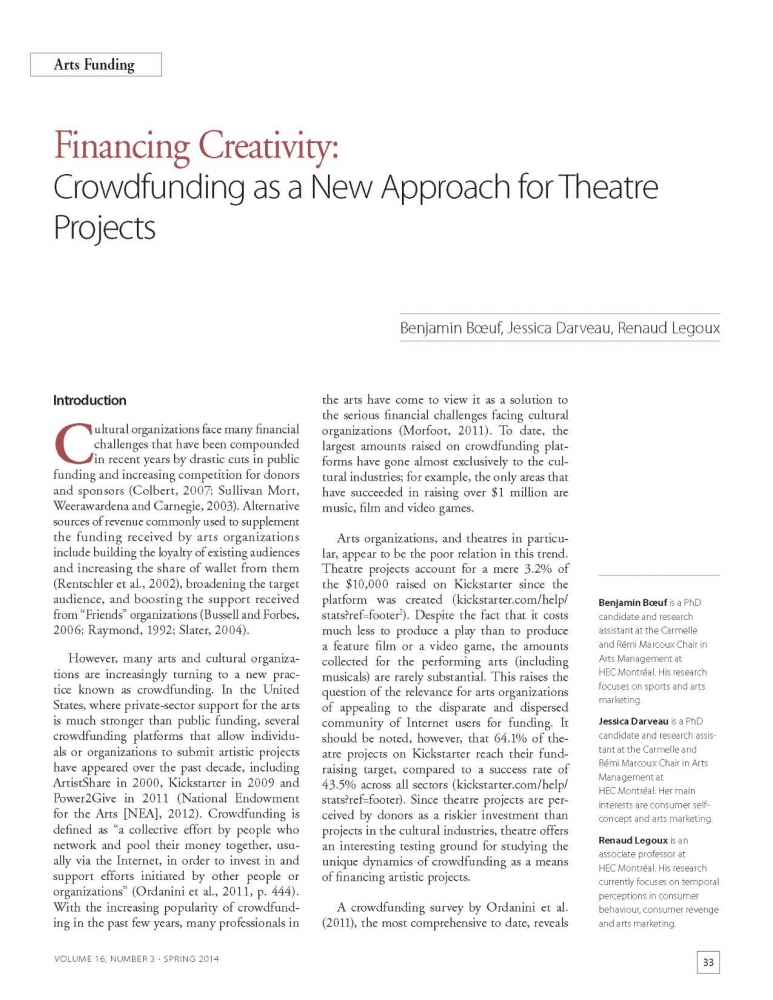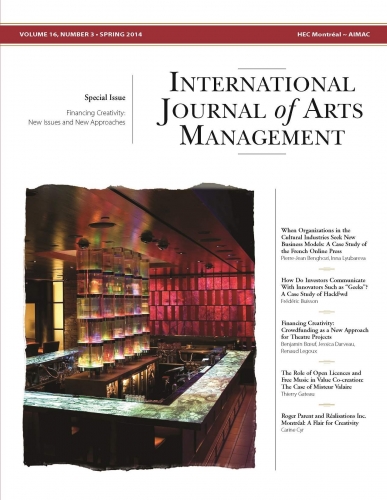Financing Creativity: Crowdfunding as a New Approach for Theatre Projects
Produit: Article
21,00 $ CA
Benjamin Bœuf, Jessica Darveau, Renaud Legoux
Benjamin Bœuf is a PhD candidate and research assistant at the Carmelle and Rémi Marcoux Chair in Arts Management at HEC Montréal. His research focuses on sports and arts marketing.
Jessica Darveau is a PhD candidate and research assistant at the Carmelle and Rémi Marcoux Chair in Arts Management at HEC Montréal. Her main interests are consumer selfconcept and arts marketing.
Renaud Legoux is an associate professor at HEC Montréal. His research currently focuses on temporal perceptions in consumer behaviour, consumer revenge and arts marketing.
ABSTRACT
This aim of this empirical study was to shed light on the phenomenon of crowdfunding, particularly with respect to the cultural and creative economy. The results highlight the relationship between donors, entrepreneurs and the crowdfunding platform in the performing arts. Data from 875 theatre projects that had successful crowdfunding campaigns on the Kickstarter platform in 2011 reveal several key factors to be considered in order for a project to reach its crowdfunding goal. The study also analyzes the effect of the offer of material and symbolic rewards, in exchange for donations, on the amounts pledged by crowdfunders. It emerges that symbolic rewards such as public acknowledgement of the donor act as an incentive for crowdfunders, but only when no material rewards are offered. The findings also show that it is advantageous for entrepreneurs to back the projects of other entrepreneurs, as this has a positive effect on the propensity of crowdfunders to support their projects. Finally, crowdfunder support diminishes with the number of previous projects financed by the entrepreneur on Kickstarter. The prosocial behaviour of the actors involved in the crowdfunding process underscores the affinities between this phenomenon and the spirit of reciprocity that is inherent to the gift economy.
KEYWORDS
Crowdfunding, fundraising, rewards, prosocial behaviour
RÉSUMÉ
Cette étude a pour objectif de mieux comprendre le phénomène du financement participatif (crowdfunding) et la pertinence de ce mode de financement pour l’économie de la culture et de la créativité. Un exemple réel de financement participatif est étudié de manière empirique afin d’en faire ressortir les spécificités du rapport entre les donateurs, les entrepreneurs et la plateforme de financement participatif, pour le secteur des arts de la scène. L’analyse de données provenant des 875 projets théâtraux ayant fait appel avec succès au financement participatif sur la plateforme Kickstarter en 2011 présente un ensemble de facteurs importants à considérer afin de faciliter l’atteinte des objectifs fixés. En ce qui a trait aux rétributions offertes, l’analyse souligne l’effet des rétributions (récompenses matérielles et récompenses symboliques) sur les sommes versées. Les récompenses symboliques, sous la forme de remerciements nominatifs publics, constituent une incitation pour les donateurs, à condition qu’aucune rétribution matérielle ne soit offerte. Les résultats obtenus démontrent également que les entrepreneurs ont avantage à soutenir à leur tour d’autres entrepreneurs afin de s’assurer l’appui des donateurs. Finalement, on remarque que l’appui des donateurs diminue avec le nombre de projets antérieurs financés. Les comportements prosociaux des acteurs intervenant dans le processus de financement par le financement participatif soulignent les affinités certaines de ce phénomène avec la logique de réciprocité propre à l’économie de don.
MOTS CLÉS
Crowdfunding, financement, récompenses, comportement prosocial
RESUMEN
Con este estudio se pretende ganar mejor comprensión del fenómeno de la financiación colectiva o crowdfunding y su pertinencia para la economía de la cultura y la creatividad. Se presenta el estudio empírico de un ejemplo real de crowdfunding con el fin de destacar las especifidades de la relación entre donadores, empresarios, y la plataforma de crowdfunding en el sector de las artes escénicas. El análisis de los datos obtenidos para los 875 proyectos teatrales que utilizaron con éxito el crowdfunding sobre la plataforma Kickstarter en 2011, presenta un conjunto de factores importantes que se han de tener en consideración para facilitar la realización de los objetivos fijados. Se destaca asimismo el efecto de las retribuciones (recompensas materiales o simbólicas) sobre los montos contribuidos. Las recompensas simbólicas, bajo la forma de agradecimiento público nominativo, constituyen un incitativo motivador para los crowdfunders, siempre y cuando no se ofrezca ninguna retribución material. Los resultados obtenidos demuestran también que es ventajoso para los empresarios respaldar a su vez a otros empresarios para asegurar el apoyo de los crowdfunders. Finalmente, notamos que el apoyo de estos últimos disminuye en función de la cantidad de proyectos financiados anteriormente. Los comportamientos prosociales de los actores involucrados en el proceso de financiación mediante crowdfunding revelan las afinidades certeras de este fenómeno con la lógica de reciprocidad propia a la economía de la gratuidad.
PALABRAS CLAVE
Crowdfunding, financiación, recompensas, comportamiento prosocial

